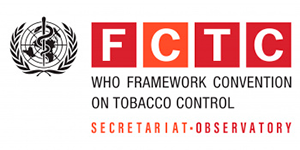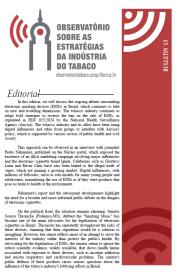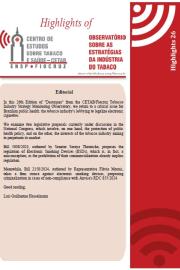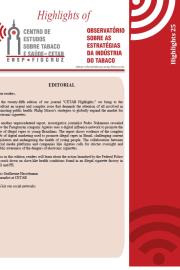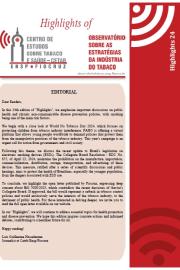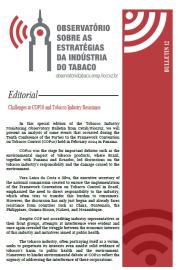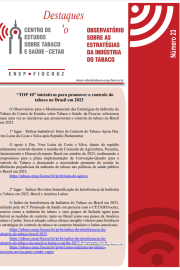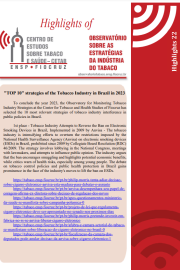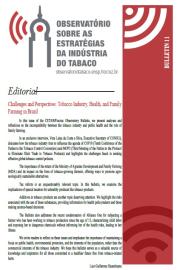'''Competitive intelligence'''
"Strategy created to monitor adversaries and social trends in order to anticipate future challenges and possible harm."
'''Bullying'''
"Strategy created to use legal and economic power as a means of harassment and threat to people who support tobacco control"1
In Public Relations, "Rebutting "Criticism" could be considered part of "Problem Management": dealing with issues that can potentially upset/contradict stakeholder expectations.
Public relations experts often say: to avoid unpleasant surprises, organizations must analyze, monitor and control external forces. [...] These forces must be analyzed from their effects on the image, the profit of an organization and its ability to act. Based on this analysis, an organization's policy should be developed, strategy planned and action implemented2.
Like most tactics adopted by the tobacco companies and their allies, they serve to denigrate the image and weaken the position of organizations working against them. This section can be seen/interpreted as the amalgamation of much of the information collected on the Observatory website.
However, the wiki's category "Rebutting Criticism" focuses on industry strategies that are aimed directly at combating the work of people active in tobacco control, academically, in healthcare, in campaign groups, or in politics. . This includes undermining the critics' credibility and the reliability of their articles/reviews, which is done through the use of arguments and language and – in an increasingly abusive way – attacks in virtual comments, in the middle of the ''weblogs''. These attacks can even turn into a smear campaign in its own right.
defamation campaigns
A tactic employed by the tobacco industry and its advocates for a long time. It consists of trying to marginalize and denigrate its critics. There is, however, a range of reported attacks that range from industry criticism to threats and abuse by pro-smoking bloggers.
A recent case of a smear campaign was against Professor Linda Bauld, an international expert on public health policy. In addition to having her work discredited, she has received a number of cyber and telephone threats, including what could be interpreted as death threats. Other academics have also been the target of threats.
Arguments and language
In public health and tobacco control debates, the tobacco industry tends to use a recurring set of arguments. The same questions and the same language keep popping up in discussions on key topics such as plain packaging, pricing and taxes, and smuggling.
Tobacco companies aim to keep topics under debate away from health-related issues - such as the dangers of tobacco use, and death rates - to more emotional issues. They are currently trying to link smoking to consumer freedom in the context of civil liberties. In this context, the smoking ban is seen as a violation of the basic rights of individuals and, therefore, is discriminatory.
The implementation of generic packaging and the government's health policy are seen as unwanted interference by the so-called Nanny State, violating both privacy and the right of free enterprise. Increasingly, tobacco industry advocates in the 'blogosphere' build their protests on arguments from the nanny state.
The industry uses these arguments and language in different ways, for example in its "Media Tactics", its "Techniques Involving Third Parties" and "CSR Tactic" (Corporate Social Responsibility). However, the objective remains the same: to get the message across and spread the ideas and arguments against tobacco regulation, targeting the general public and "influencers of decision-makers".
Arguments used in Brazil
The tobacco industry repeatedly applies the arguments that the Nanny State aims to discipline and control society, exempting us from the right of free enterprise. Recently, the industry has criticized Law No. 12546 of December 14, 20113, but regulated in 20144, emphasizing that the prohibition of smoking in closed environments implies a new intervention by the State in the behavior of society and bringing economic losses, however omitting the importance of the law in relation to public health. In addition, it is clear that the speech of economic loss is fallacious, since the sale of cigarettes was reflected in an increase of 20% in 2011, thanks to the investment of Japan Tobacco International (about R$ 10 million), in addition to the inauguration of the World Development Center in the region of Santa Cruz do Sul (RS), a key hub for tobacco production in Brazil5.
In addition, organizations linked to the tobacco industry such as the Brazilian Association of Bars and Restaurants (ABRASEL), the Sorocaba Hotel, Restaurant, Bar and Similar Union (SINHORES) and the like, work to maintain the anti-tobacco control discourse, claiming
loss of clientele and consequently economic loss.
Case Study
"The Telegraph's Letter to the Editor", published on World No Tobacco Day in 2011, is a good example of the rhetoric used today. It is also a classic example of how the industry uses "Techniques Involving Third Parties". Despite being signed by seemingly independent groups, some of them still have links to the tobacco industry or received funding from the tobacco industry in the past. It is difficult to gauge how many still receive money from the industry, as many do not disclose their funding.
The content of the letter is a mixture of the latest industry arguments. The authors:
* Ridicule government plans
* Take a path against regulation
* They imagine the State as an enemy of industry and free enterprise in general,
* Defend the interests of small retailers
* Use “risk of increased smuggling” as a counter-argument to ban
* They undermine the credibility of the government.
Tobacco Control opponents often advocate self-regulation, claiming that the right to freedom of choice, linked to personal responsibility, must take precedence over public health.
The argument used against the implementation of generic packaging is, according to the industry, that economic damage will occur to small store owners, who are cited as victims. The argument against the ban is that many bars will lose clientele and some may close.
The fight against plain packaging is also fought over intellectual property. Tobacco companies claim that international regulation guarantees their brand protection by claiming the use of the company logo as a universal right. However, the legal battle over these issues is raging in Australia. See the Observatory pages on "Legal Tactics" and "Generic Packaging" in Australia.
Defaming the tobacco regulatory community
''"One last trick is to become personal, hostile, rude, as soon as you realize that your opponent has the upper hand, and that you 'go wrong'. This tactic consists of shifting the focus from the object of dispute (such as argumentation on a due topic) to the litigant, to, in some way, attack him. But, by making the issue personal, the real pertinent problems are made to come together and disappear, through an offensive argument loaded with rancor"''6.
Background: "Let's call them Health Fascists"
''The only way to preserve the right to smoke is to associate it''
''with the freedom of choice of lifestyle, and with the libertarian critique of''
''"Fascism in health" and with the authoritarianism of the medical 'establishment'."''7.
The tobacco industry has long tried to marginalize its opponents by labeling them 'extremists'. In his 1989 Future Strategy, then-Forest director Chris Tame proposed to align himself with the libertarian cause and at the same time attack public health advocates, labeling them the 'health fascists'. 8 This, in line with Forest's 1983 strategy to become "an aggressive and intemperate adversary".9. The "Forest" page has more examples of the results of this approach.
In 1996, a decade-long program created by Philip Morris called "Project Sunrise," aimed to divide and repel the tobacco control movement, in part, by attacking them as extremists. 10. In fact, this was based on the 'Forest' strategy from previous years.
Misrepresenting the debate through the use of language
More recently, there is a concerted effort among pro-tobacco bloggers to demonize the tobacco control community and define them as 'extremists', 'fanatics, 'fascists', etc. A pro-tobacco blogger, Chris Snowdon even invokes similarities with the Irish Republican Army (PIRA)11.
Trying to undermine the reputation of people who seek to protect public health by labeling them as 'extremists' is a deliberate tactic of the pro-tobacco movement. At the same time, the industry and its front groups such as "Forest" realized that because the tobacco industry is such a controversial and discredited voice, speaking on its behalf would generate public antipathy. That's why the industry and its supporters use words like "freedom", "independence" and "sanity" to describe their activities.
In this way, the focus of the debate changes. It goes from being about an industry that kills one in two of its longtime users to recruiting young smokers to stay in business, to a libertarian argument about "freedom" and the excesses of the "nanny state." . The language is always carefully crafted. The coalition of libertarian groups arguing against "generic packaging" in the UK was christened the "Coalition of the Saints". This would suggest that a public health measure designed to protect children from smoking is somehow harmful.
Manipulation is complete when someone paid by the tobacco industry, which is an industry with a history of deception and lies, ends up being described as a defender of freedom, so when someone is working to protect public health, they will be labeled ' extremist'.
The wordplay employed by the industry and its supporters is becoming increasingly pervasive and perverse. More than any other industry, large tobacco companies have a tradition of employing front groups, also called groups, to get their message across.
But while many Research Institutes and groups that promote tobacco do not disclose whether they receive funding from third parties, those anti-tobacco organizations linked to the British health system have been labeled "astroturf" organizations.12.
Other usual fronts of attack are allegations that anti-tobacco scientists who publish in indexed scientific journals would be willing to do anything for money, including deliberately manipulating statistics, weakening the discourses used by public health or even misrepresenting them to other focuses, fostering discussions on issues or products that are not related to the tobacco industry13. There are new cases of bullying documented on the TobaccoTactics website. These are threats against scientists and anti-tobacco activists. The atmosphere created by these detractors (labeling people as 'health fascists', 'Nazis', 'extremists', etc.) also dehumanizes scientists, making it more likely that physical aggression can be leveled at them.
Examples of situations where healthcare professionals are portrayed as 'extremists':
Pro-tobacco bloggers who denigrate the tobacco control community include:
In this regard also read:
* Exaggerating the economic importance of the industry
- 1. WORLD HEALTH ORGANIZATION. Tobacco industry interference with tobacco control, 2008. Disponível em: http://whqlibdoc.who.int/publications/2008/9789241597340_eng.pdf?ua=1 http://whqlibdoc.who.int/publications/2008/9789241597340_eng.pdf?ua=1. Acesso em:24 out. 2014. Documento integral em PDF: https://drive.google.com/file/d/0B0HvJttn0WXDVmJCX0RPM3ZQWnM/view?usp=sh....
- 2. BASKIN, Otis; ARONOFF, Craig; LATTIMORE, Dan. Public relations: the profession and the practice. Estados Unidos: Brown & Benchmark, 1997. P. 80.
- 3. BRASIL. Lei Nº 12546, 14 de dezembro de 2011. Presidência da república, Brasília, DF, 2011. Disponível em: https://www.planalto.gov.br/ccivil_03/_ato2011-2014/2011/lei/l12546.htm. Acesso em: 8 jan. 2014. Documento integral em PDF: https://drive.google.com/file/d/0B0HvJttn0WXDNlVSeG43cV9mTms/view.
- 4. OLIVEIRA, Anderson. Lei restringe fumódromos no comércio e setor prevê maior queda no movimento. Cruzeiro do Sul, São Paulo, 15 dez. 2012. Disponível em:http://www.cruzeirodosul.inf.br/materia/585674/lei-restringe-fumodromos-.... Acesso em: 7 jan. 2015. Documento integral em PDF: https://drive.google.com/file/d/0B0HvJttn0WXDRDhlNFZWTTM2NFE/view.
- 5. MESMO com restrições ao fumo, investimento no tabaco cresce. JCNET, São Paulo, 25 dez. 2011. Disponível em: http://www.jcnet.com.br/Economia/2011/12/mesmo-com-restricoes-ao-fumo-in.... Acesso em: 30 out. 2014. Documento integral em PDF: https://drive.google.com/file/d/0B0HvJttn0WXDLWQ1Qmwtd043Z0U/view?usp=sh...
- 6. SCHOPENHAUER, Arthur. The art of controversy. Inglaterra: Swan Sonnenschein, 1896. Disponível em: https://ia801409.us.archive.org/11/items/artofcontroversy00schouoft/arto... https://ia801409.us.archive.org/11/items/artofcontroversy00schouoft/arto.... Acesso em: 24 nov. 2014. Documento integral em PDF: https://drive.google.com/file/d/0B0HvJttn0WXDeXB1bl81T2FMWEU/view?usp=sh....
- 7. TAME, Chris. Forest's future strategy: a discussion. Legacy Tobacco Documents Library, Estados Unidos, 27 fev. 1998. Disponível em: http://legacy.library.ucsf.edu/tid/tvs28c00 http://legacy.library.ucsf.edu/tid/tvs28c00. Acesso em: 7 nov. 2014. Documento integral em PDF: https://drive.google.com/file/d/0B0HvJttn0WXDbWxPT25CVGh2TGs/view?usp=sh....
- 8. id.ibid.
- 9. IS FOREST exportable? Legacy Tobacco Documents Library, Estados Unidos, 22 set. 1983. Disponível em: [http://legacy.library.ucsf.edu/tid/wys55b00/pdf http://legacy.library.ucsf.edu/tid/wys55b00/pdf]. Acesso em: 24 nov. 2014. Documento integral em PDF: https://drive.google.com/file/d/0B0HvJttn0WXDRjcxOEptT1V1MTg/view?usp=sh....
- 10. McDANIEL, Patricia; SMITH, Elizabeth; MALONE, Ruth. Philip Morris’s Project Sunrise: weakening tobacco control by working with it. Tobacco Control, v. 15, p. 215-223, 2014. Disponível em: http://tobaccocontrol.bmj.com/content/15/3/215.full.pdf+html http://tobaccocontrol.bmj.com/content/15/3/215.full.pdf+html. Acesso em: 3 dez. 2014. Documento integral em PDF: https://drive.google.com/file/d/0B0HvJttn0WXDODh4XzI5anFfRXc/view?usp=sh....
- 11. Note: PIRA will succeed the 'historic' Irish Republican Army, from 1969.
- 12. SNOWDON, Chris. Astro-turf group breaking the law in Liverpool? Velvet glove, ironfist, Inglaterra, 22 abr. 2012. Disponível em: http://velvetgloveironfist.blogspot.co.uk/2012/04/astro-turf-group-break... http://velvetgloveironfist.blogspot.co.uk/2012/04/astro-turf-group-break.... Acesso em: 24 nov. 2014. Documento integral em PDF: https://drive.google.com/file/d/0B0HvJttn0WXDa3pOX3M0X05vaE0/view?usp=sh....
- 13. RIBEIRO, Renato Janine. O direito de fazer mal a si próprio. Zero Hora, Rio Grande do Sul, 10 jan. 2015. Disponível em: http://zh.clicrbs.com.br/rs/noticias/proa/noticia/2015/01/renato-janine-.... Acesso em: 21 jan. 2015. Documento integral em PDF: https://drive.google.com/file/d/0B0HvJttn0WXDaGMzTWpsLVlIejA/view?usp=sh....

